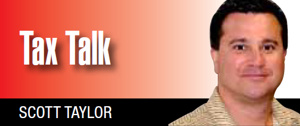So here I am in April, researching the deductibility of life insurance because one of our clients just bought a benefits package that includes medical, dental, health, disability, and life insurance.
The insurance salesman told our client it was all 100% deductible. That’s 100% wrong in this case, but the client wants proof. As I scour the Canada Revenue Agency (CRA) website the words “the salesman said” just keep ringing in my ears.
Of course the salesman is right. Why would he stretch the truth? And of course the accountant is wrong. What would he know about taxes?
The fact is, you can deduct all ordinary commercial insurance premiums you incur on any buildings, machinery, and equipment you use in your business. Insurance costs related to your service vehicle have to be claimed as motor vehicle expenses. Insurance costs related to business use of a work space in your home have to be claimed as business-use-of-home expenses.
In general, you cannot deduct your life insurance premiums. However, if you use your life insurance policy as collateral for a loan related to your business, you may be able to deduct a part of the premiums you paid.
So to expense life insurance it must be payable directly to the finance company or you must be incorporated and have your corporation listed as the beneficiary on your policy so it will have the money to pay loans and other business debts. If the life insurance is payable to your friends and family, it is not deductible.
Employee benefits
Under “employee benefits” the CRA site speaks to employer-paid life insurance premiums as a taxable benefit and explains how to calculate the income tax to be paid. Remember, your corporation is the employer and you are the employee.
Tax guidelines for disability insurance are similar. Generally, premiums paid by an employer to a nongroup plan for sickness or accident insurance, disability insurance, or income maintenance are a taxable benefit.
|
There are a few truths in life: death, taxes, don’t pee into the wind, and don’t believe everything a salesman tells you.
|
Employer-paid premiums for short-term or long-term disability on a group plan are not taxable benefits. However, when your employer pays any amount toward your shortterm or long-term disability coverage, any benefits you may collect in the future will be taxable.
Since proceeds from life insurance are not taxable CRA is not going to allow you to expense the premiums and cost of buying it. With disability, you have a choice: expense it and pay tax later if you ever collect, or don’t expense it and don’t pay tax if you ever collect.
Taxable benefits
Here are some other items your employer (that’s you) should be considering for your employee (also you): Companies frequently provide employees with smartphones plus a voice and data plan. Even if you use your phone for both work and pleasure, CRA will generally not consider the payments as a taxable benefit as long as the cost of the cellphone plan is reasonable and you do not incur costs for personal use (ie., additional long-distance charges) beyond the basic fee for the plan.
If your employer gives you noncash gifts or awards for performance worth less than $500, the value of the award is not a taxable benefit. Similarly, non-cash awards for length of service worth less than $500 are not considered taxable if you have worked for the organization for at least five years and are not eligible for such an award more often than every five years.
A free party or other social event for all company employees where the cost is $100 per person or less is not a taxable benefit. Transportation home, taxi fare, and overnight accommodation are not included in the $100 per person amount.
So let’s get back to that expert salesman’s advice. It’s easy to believe what you want to hear in a world of fake news and alternative facts. But there are still a few truths in life: death, taxes, don’t pee into the wind, and don’t believe everything a salesman tells you.
Scott Taylor is vice-president of TFS Group, providing accounting, bookkeeping, tax return preparation, and other business services for owner/operators.
Learn more at www.tfsgroup.com or call 800-461-5970.
